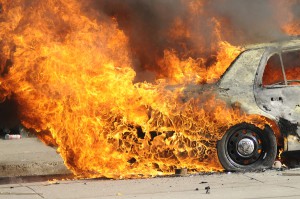 Businesses in Baltimore are still cleaning up from damages and facing a curfew after riots broke out in the city earlier this week.
Businesses in Baltimore are still cleaning up from damages and facing a curfew after riots broke out in the city earlier this week.
For days, thousands have peacefully protested in the wake of the death of Freddie Gray, the 25-year-old man who died after a spinal injury while in police custody. On Monday, tensions reached a breaking point, with riots and looting breaking out across the city.
Due to the unrest, a mandatory 10:00 p.m. to 5:00 a.m. curfew is in effect from Mayor Stephanie Rawlings-Blake, but it’s going to do more than keep people indoors at night.
While the curfew is in place, it will have major implications for owners of bars, clubs and late night food establishments who lose out on the revenue from the lost hours of business.
The destruction is affecting more than Baltimore’s nightlife, as major events have been cancelled as well.
The American Heart Association and Door and Hardware Institute both cancelled conventions they had scheduled for this week. The conventions were expected to bring a total of around 2,300 people into the city.
Baltimore’s professional sports teams have also suffered from the strife. The Baltimore Orioles decided to postpone home games that should have been played earlier in the week, according to a press release.
The Orioles still played the White Sox on Wednesday, but the match was closed to the public. No fans at the game meant a major loss of concession, merchandise sales and other stadium revenue.
Officials in Baltimore are looking to regain control of the city. Maryland Governor Larry Hogan has declared a state of emergency and called in the National Guard for their assistance.
The fires can be put out, the doors can be fixed and the broken glass can be swept, but the peace of mind and promise of future business in Baltimore might not be replaced so easily.
The ramifications of the riots could continue to affect businesses even after the curfew is lifted.
Businesses face lost wages while employers send their workers home. There is also potential lost capital from tourism, as tourists might not view Baltimore as a safe travel destination just yet.
In a 2004 study on the 1992 Los Angeles riots found that the city lost out on about $3.8 billion as a result of the riots.
“The economic impact of riots is even larger than that of natural disasters because businesses are more likely to see natural disasters as a one-time occurrence as opposed to an ongoing safety issue,” Victor Matheson, co-author of the study, told the Baltimore Business Journal.





